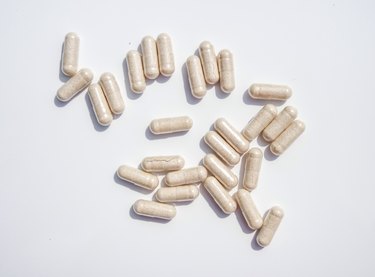
When it comes to losing weight and keeping it off, slow and steady wins the race. Unfortunately, the urge to find a "quick fix," which may include fad diets or weight loss supplements often takes over and many people find themselves wondering if there are diet pills that really work.
Tip
If you have questions about diet pills, talk with your doctor about any potential benefits or adverse side effects. The best way to lose weight is with a healthy diet and physical activity.
Video of the Day
What are Diet Pills?
Over-the-counter diet pills are dietary weight loss supplements that claim to help people lose weight and shed fat. Many companies market their supplement as the best fat burner on the market. Some even take this one step further and tell consumers they don't need to make any changes to their current diet or exercise routine.
Video of the Day
While a magic pill would be nice, the Mayo Clinic points out there is no such thing as a magic bullet for losing weight. They also point out that diet pills are at best, a tool that may help with weight loss.
But there is minimal research to support this. And in fact, the majority of the larger studies were done using prescription weight-loss drugs, which leaves many consumers wondering if there are OTC diet pills that really work.
What's more, the U.S. Food and Drug Administration (FDA) only regulates the claims made by makers of prescription diet pills and nonprescription drugs. They do not review or approve a dietary weight loss supplement's marketing claims for safety or effectiveness before the product hits the market.
Plus, the quality or type of research a supplement company uses to support their claims can vary. And while the FDA does have requirements and regulations that state companies need to provide safe and accurate labels with no misleading claims, you're still left with taking the word of the company that sells the product.
Ingredients in Diet Pills
The ingredients in a weight-loss dietary supplement or natural fat burner pills can vary from a dozen to more than 90, according to the National Institutes of Health (NIH). That said, there are some common ingredients that make an appearance in many of these supplements including:
- Caffeine
- Green tea
- Bitter orange (Citrus aurantium L.)
- Capsaicin
- Garcinia cambogia
- Yohimbe
- Coleus forskohlii
Many of the ingredients used in dietary supplements have minimal research to back-up claims of weight loss. However, there are a few, such as caffeine and green tea, that have studies and research supporting and also disputing these statements. For example, a January 2016 article published in the Journal of Basic and Clinical Physiology and Pharmacology suggests that, based on various studies, caffeine can potentially be considered as a body-weight regulator.
The NIH points out that bitter orange, which is commonly used in weight loss supplements, may result in an increase in resting metabolic rate and energy expenditure, but the effects on weight loss are inconclusive. Green tea, while shown to have possible modest effects on body weight, has very few clinical trials.
The bottom line is this: If you are thinking about taking a weight loss supplement, talk with your doctor first, especially if you have a medical condition or you're taking prescription medications. There are risks involved with some of the ingredients, so it's better to err on the side of safety.
Other Ways to Lose Weight
Whether you choose to take diet pills, it's important to note that there are many tried and true methods of losing weight that don't require you to buy or take any supplements. In fact, the NIH says the best way to lose weight and keep it off is to follow a sensible approach that incorporates a healthy eating plan, reduced caloric intake, and moderate physical activity.
They also remind consumers that the evidence supporting dietary supplements to stimulate weight loss is inconclusive and the costs are high. Not to mention the safety concerns associated with many weight loss supplements.
However, what they do support, like many other experts, is a healthy diet along with exercise. The Academy of Nutrition and Dietetics recommends building your diet around fruits, vegetables, whole grains that contain dietary fiber, low-fat milk, yogurt and cheese, and lean meat, poultry, seafood, beans and lentils.
As far as exercise, the U.S. Department of Health and Human Services says that adults should aim for 150 minutes a week of moderate-intensity or 75 minutes a week of vigorous-intensity aerobic activity. Plus, two or more days of muscle-strengthening exercises. If your goal is weight loss, consider the American Heart Association's target of 300 minutes, which can lead to even more health benefits.
- National Institutes of Health: "Dietary Supplements for Weight Loss"
- U.S. Food and Drug Administration:"Dietary Supplements"
- Journal of Basic and Clinical Physiology and Pharmacology: "The Effect of Caffeine on Energy Balance"
- Academy of Nutrition and Dietetics: "Back to Basics for Health Weight Loss"
- U.S. Department of Health and Human Services: "Physical Activity Guidelines for Americans"
- American Heart Association: "American Heart Association Recommendations for Physical Activity in Adults and Kids"
- The Mayo Clinic: "Over-the-Counter Weight Loss Pills: Do They Work?"
- Linus Pauling Institute: Calcium
- Gastroenterology Research and Practice: The Use of Green Coffee Extract as a Weight Loss Supplement: A Systematic Review and Meta-Analysis of Randomised Clinical Trials
- Journal of the International Society of Sports Nutrition: Eight Weeks of Supplementation With a Multi-ingredient Weight Loss Product Enhances Body Composition, Reduces Hip and Waist Girth, and Increases Energy Levels in Overweight Men and Women.